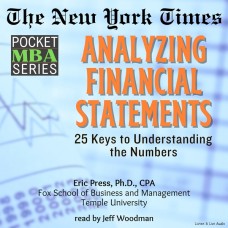Key 1. Accounting is not a four-letter word.
Key 2. Financial statements rely on fact, not possibility.
Key 3. What's hanging in the balance sheet?
Key 4. Take steps to understand the income statement.
Key 5. Matching and adjusting-the crux of accrual accounting.
Key 6. Who decides what financial statements contain?
Key 7. Where cash came from and where it went.
Key 8. Monetary matters need not be murky. Follow the cash.
Key 9. Keeping owner's claims straight.
Key 10. Don't ignore the fine print! Read the footnotes.
Key 11. What shapes a firm's financial reporting strategy?
Key 12. Financial reports are useful for both running and evaluating the company.
Key 13. Financial statements have trouble measuring future opportunities properly.
Key 14. You got the basics, so how are financial data used to compare one firm with another?
Key 15. Staying alive: analyzing financial data to measure the health and survivability of a firm.
Key 16. How great are the costs of financial distress?
Key 17. Estimating the cost of using up productive capacity: depreciation.
Key 18. Computing costs of goods sold, and valuing inventory.
Key 19. What do we have to pay? Accounting for taxes.
Key 20. Don't overlook long-term obligations: debt and leases.
Key 21. More long-term obligations: pensions and other benefits.
Key 22. Untangling the web of inter-corporate investments.
Key 23. Is my company global? Should I care?
Key 24. What I am buying if I purchase a foreign firm's stock?
Key 25. What are other sources of financial information?
Analyzing Financial Statements is part of The New York Times Pocket MBA Series, a reference series easily accessible to all businesspersons, from first-level managers to the executive suite. The 12-volume series is written by Ph.D.s who teach in the finest graduate business programs in the country, and edited by business editors from The New York Times. The structure of each volume presents an unparalleled synopsis of crucial principles of specific areas of business expertise.
---
Eric Press, Ph.D., is an Associate Professor of Accounting at the Fox School of Business and Management at Temple University. A CPA in Washington state, he serves on editorial boards and as a referee at numerous publications, including The Accounting Review, Contemporary Accounting Research, Accounting Horizons and The Journal of Accounting and Public Policy. From 1994 to 1998, Eric served as a member of the American Institute of Certified Public Accountants' SEC Regulations Committee.
AUTHOR
Jeff Woodman has been named one of the "Fifty Greatest Voices of the Century" by Audiofile Magazine. On stage, he created the title role in Tennessee William's The Notebook of Trigorin and won the S.F. Bay Area Critic's Circle Award for An Ideal Husband. He lives in New York City.
---
REVIEWSAudioFile
"A concise lesson on every aspect of corporate financial reporting. Deftly narrated by a consummate professional."
AV Guide
"...brings important business principles as close as your headphones."
Analyzing Financial Statements
Author: Eric Press, PhD
Narrator: Jeff Woodman
ISBN: 9781593162832
SRP: $19.95
Length: 2:30:00
Item No: LL302
Available on the following websites: Amazon, Apple, Audible, AudioBookStore, Audiobooks, Blackstone, Catalist, Epic!, Kobo, Libro.fm, Mackin, Overdrive, StoryTel, Tumblebooks.
Related Products
Managing Investment
Learn the 25 keys to selecting and managing outside investment, through mergers, acquisitions and ..
Forecasting Budgets
Learn the 25 keys to the art of the budget in terms of forecasting costs, revenues and profits for..
Organizing A Company
Learn the 25 keys to sole proprietorship, partnership, subchapter S and family ownership. Key 1. ..
Leadership & Vision
Learn the 25 keys to supervising and motivating management staff to realize your company vision, t..
Going Global
Learn the 25 keys to doing business on an international scale, including foreign exchange risks and ..
Growing & Managing A Business
Learn the 25 keys in managing the growth of a business, including identifying the company's compet..
The Board of Directors
Learn the 25 keys to the role of the Board of Directors and the important points in helping to gui..
Sales & Marketing
Learn the 25 keys to build awareness of new brands and learn the secrets of forceful advertising and..
Tracking & Controlling Costs
Learn the 25 keys to understand how financial reporting and cash flow become the essential tools t..
.png)









